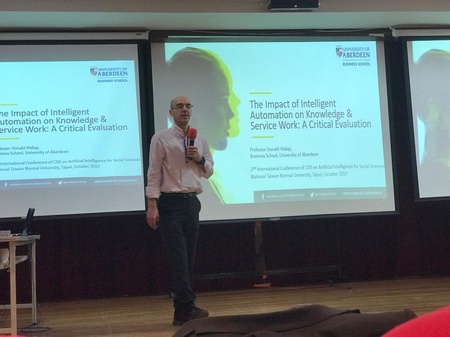I have just returned from my first visit to Taiwan, to give a keynote talk at a conference on Artificial Intelligence organised by the College of International Studies and Social Sciences at the National Taiwan Normal University, which is located in Taipei. I gave the opening keynote talk, on the potential impacts that AI technologies may have on knowledge and service work, such as eliminating some jobs completely, automating routine parts of other jobs, transforming some jobs, and also potentially creatine completely new types of job, and industry. This is an area of significant uncertainty, and academic opinion on these issues is divided. My paper gave an overview of current knowledge on these issues, and outlined areas requiring further investigation. My paper was well received by the conference audience, and stimulated much debate.
My presentation, based on research done with collaborators, and ex-colleagues at Loughborough University, suggests that the pessimist regarding potentially significant job losses due to AI-based automation is exaggerated. While some highly routine types of admin and office work may be eliminated, the use of AI technologies is likely to automate only routine parts of jobs, and require people to still carry out more creative, or people-centred activities. One consequence of this is that many workers are increasingly going to have to use, and collaborate with AI technologies in carrying out their work. Another key argument in my presentation is that knowledge regarding the impact of AI technologies on work is still highly uncertain. While there has been much hype and speculation regarding there technologies, both optimistic, and pessimistic, and while there have been various trial, pilots, and experiments with these technologies, the full-scale implementation of these technologies in work, is still somewhat limited. Thus, there is significant scope for academic research to go beyond the hype and speculation, to investigate the real impacts of the use of these technologies in workplaces.
I was one of a number of international speakers, invited to make contributions to the conference, with other speakers from Japan, the USA, Korea, and Thailand. One aim of the conference was to consider the wide ranging implications of AI technologies, for work, and society, and this was reflected in the topics of the various international speakers, which included the use of AI in detecting fake news, and in supporting the learning of languages.
Overall, the key benefit of the visit was that it allowed me to develop a network with a range of relevant and interesting Taiwanese academics, and to explore the potential for ongoing collaboration with the particular academics who invited me. I am optimistic that this visit and talk may represent the start of a fruitful collaboration, where comparisons can be made between developments in AI in the UK and Taiwan. Thus, while the trip was tiring, due to the large amount of travel involved in attending the conference, combined with the significant time difference that exists between the UK and Taiwan, I am also excited by the collaborative potential the trip has produced.


